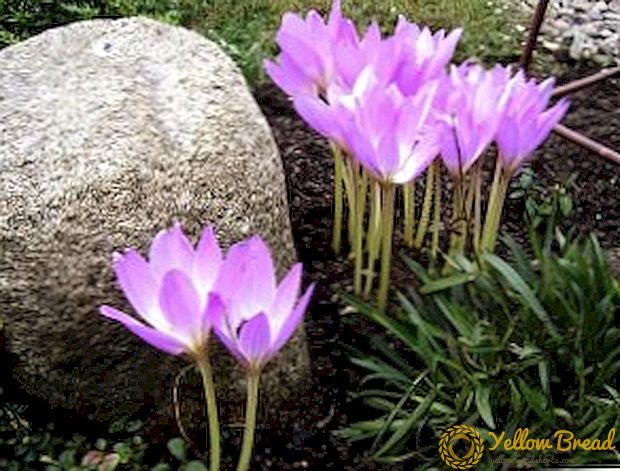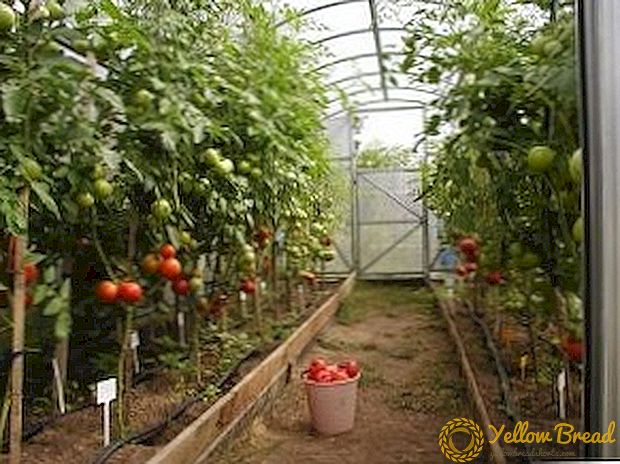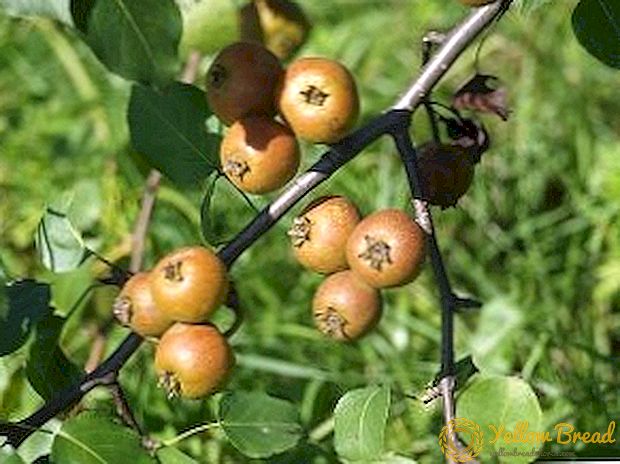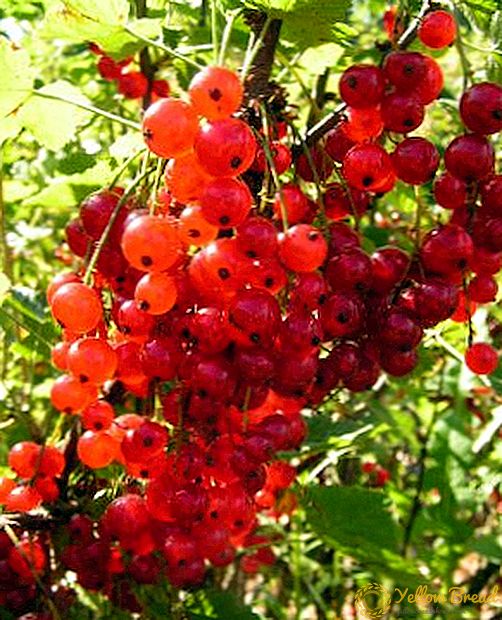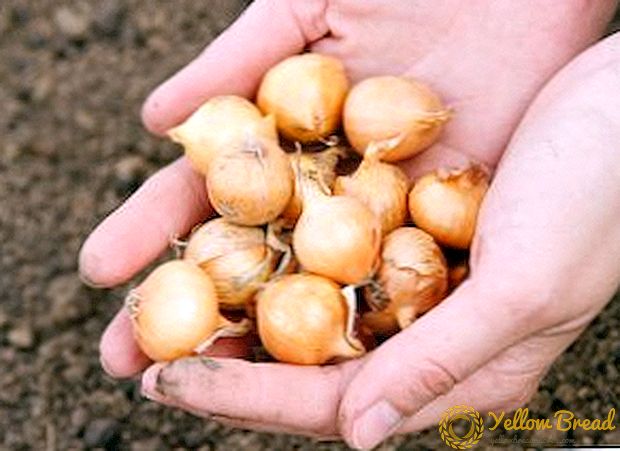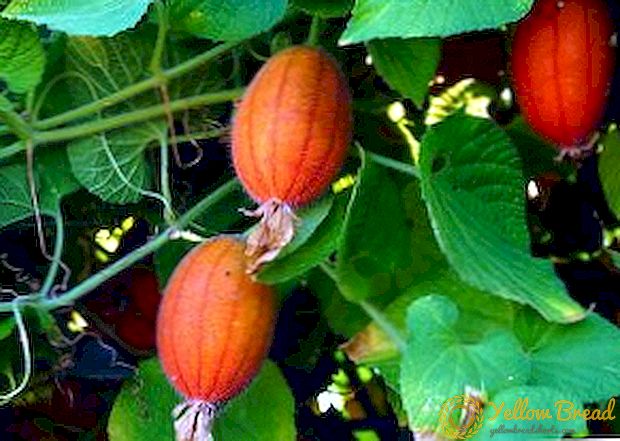
There are many varieties of grapes that are suitable for our vineyards.
The key to getting a good harvest is the proper care of the bushes, but with the modern pace of life you will hardly be able to devote a lot of time to the grapes.
That is why the Chameleon variety, which not only takes root in almost any soil, but also does not require special care, is quite suitable for planting.
All the features of this grape variety are described below.
Description of the grape variety "Chameleon"

Grapes "Chameleon" - a mixture of varieties "Atlant Zaporozhye", "Glasha", "Arcadia" and "Kishm Radiant."
"Chameleon" was bred by the hands of the Ukrainian amateur breeder N. P. Vishnevetsky. The purpose of creating such a grape was to combine beautiful taste, high yield and light crunch of fruits.
"Chameleon" ripens very early (for 100 - 110 days), so the fruits are ready for use in early August. The harvest can not be removed for a long time, while the taste of the fruit will not change. Shrubs grow lush, bisexual flowers. The clusters are very weighty, the mass can reach up to 2 kg. The berries are also very large, the mass of one is 10–14 g, and the size is 32 x 28 mm. The color of the skin is light pink, the flesh is very juicy and sweet.
Productivity is very high, with proper care, one bush can produce more than 30 kg of fruit.It tolerates frost safely, can withstand a drop in temperature to -23 ° C. This variety is resistant to fungal diseases, but can sometimes be affected by mildew.
Merits:
- expressive taste
- high frost resistance
- early ripening
- high yield
- large clusters and berries
- resistance to fungal diseases
disadvantages:
- may be affected by mildew
About the features of planting varieties

"Chameleon" - unpretentious varietytherefore, it can be grown in almost any soil. As for landing time, both spring and autumn will do. But it is still better to plant seedlings in the spring, when nature wakes up after winter.
Between the bushes you need to make a distance of 3 m, so that all the plants have enough space. The roots of the seedling should be large, about 15 - 20 cm in length, about 2 cm thick, white on the cut. The shoot must be bright green with 4-5 eyes. If there are two or more shoots of a seedling, then the strongest of them must be left. Otherwise, the bush will grow very long.
Before planting, the roots should be cut a little, with the lower roots removed and the side leaves. Growth enhancers will not interfere with the roots (Heteroauxin, Cornevin).They will help the roots to settle down faster.
In order to properly plant the grapes, you need to dig a large enough hole (0.8x0.8x0.8 m) for each seedling. The land that remained after digging should be divided into more and less fertile: the one that was below is less fertile, and the one that was above, will be more fertile. The richer land must be mixed with organic fertilizers and filled with this mixture 40 - 45 cm from the depth of the pit.
After that, the seedling "heel" must be put on this ground and sprinkled with earth, which was the lower layer. It is not recommended to fill the seedling completely. It will be better if you leave 5 - 10 cm of free space where you need to water the seedling.
Just after planting, the seedling will need to water for the first time 1.2 - 2 buckets of water, and after watering cover the ground with mulch for the best preservation of moisture.
Tips on caring for the Chameleon variety
- Watering
With regard to watering varieties "Chameleon", then no features were noted. This variety, like most others, needs additional moisture, which must be applied in early spring, before flowering, after flowering, before harvesting and before shelter.
The volume of standard watering should be 2 - 3 buckets of water per 1 square meter, and the volume of the last irrigation should be increased to 5 - 6 buckets per 1 square meter. Between two watering should take about 2 weeks.
It is necessary to correctly introduce moisture into the soil either through drainage or into a circular hole 30–40 cm deep. Such a hole needs to be dug about 0.5 m from a seedling or a bush.
- Mulching

To prevent water starvation in grapes, it is necessary mulch regularly.
Such materials as straw, grass, sawdust, paper will help to save water in the ground. In thickness, such a layer should reach 5 cm, otherwise there will be no effect. In addition to preserving water in the soil, mulch does not allow weeds to grow. This procedure should be carried out regularly several times per season.
- Harboring
Covering the grapes for the winter is simply necessary, even if this variety has high rates of frost resistance. This also applies to the Chameleon variety. It can be covered with both polyethylene and earth. In both cases, the bushes are tied, laid on the ground and secured.
Then you can simply sprinkle the vines with a large amount of earth, or pull polyethylene over them, which will stick with metal arcs. Both methods are effective.
- Pruning
Clusters of the "Chameleon" variety can sometimes go up to 2 kg in weight, which is an unreasonable load on the vines. Therefore, you need to normalize the load. For this spring, you need to remove weak shoots, and fruit-bearing ones - cut at the level of 5 - 6 peepholes so that the load on the bush does not exceed 30 peepholes. So the vines will not be too tense, and you get a decent harvest.
- Fertilizer
To get a bunch of grapes "Chameleon" weighing 2 kg, fertilizer can not do. Therefore, every year, in the spring it is imperative to make mineral fertilizers that will replenish the reserves of potassium, phosphorus, zinc, and nitrogen in the soil. In early spring and before flowering, you need to make a full range of feeding.
Before harvesting the soil do not need to make only nitrogen.
Before winter shelter grapes will not interfere with potassium. Organic matter (peat, humus, compost, litter) must be made every 2 - 4 years.
- Protection

"Chameleon" can be damaged by mildew, so be sure to handle the bushes after the first manifestation of the disease.
The treatment should be carried out with such preparations as cynos, folpet, captan.
In these drugs it is better to add sulfur, which will speed up the healing process of the bushes.

